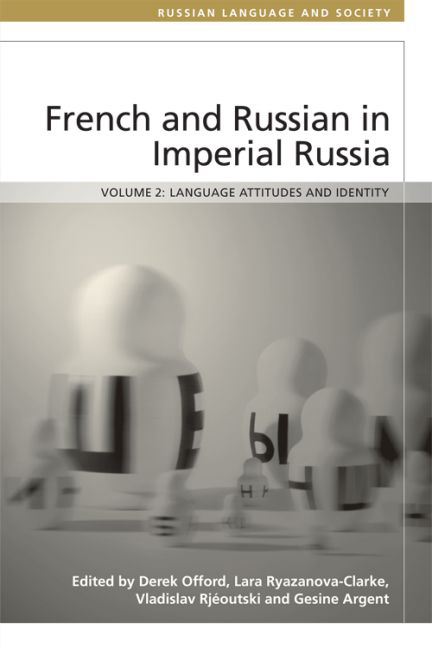Book contents
- Frontmatter
- Contents
- Preface
- Note on Dates, Transliteration and Other Editorial Practices
- Abbreviations Used in the Text, Notes and References
- Dates of Reigns in Eighteenth- and Nineteenth-Century Russia
- Dedication
- Introduction
- 1 The Pan-European Justification of a Multilingual Russian Society in the Late Eighteenth Century
- 2 Princess Dashkova and the Politics of Language in Eighteenth-Century Russia
- 3 Plating ‘Russian Gold’ with ‘French Copper’: Aleksandr Sumarokov and Eighteenth-Century Franco-Russian Translation
- 4 Francophone Culture in Russia Seen through the Russian and French Periodical Press
- 5 Linguistic Gallophobia in Russian Comedy
- 6 The Linguistic Debate between Karamzin and Shishkov: Evaluating Russian–French Language Contact
- 7 Language and Conservative Politics in Alexandrine Russia
- 8 Seduction, Subterfuge, Subversion: Ivan Krylov's Rewriting of Molière
- 9 The French Language of Fashion in Early Nineteenth-Century Russia
- 10 Russian ‘Translations’ of Patrie in the Napoleonic Period
- 11 Treatment of Francophonie in Pushkin's Prose Fiction
- 12 Love à la mode: Russian Words and French Sources
- Conclusion
- Notes on contributors
- Index
11 - Treatment of Francophonie in Pushkin's Prose Fiction
Published online by Cambridge University Press: 25 October 2017
- Frontmatter
- Contents
- Preface
- Note on Dates, Transliteration and Other Editorial Practices
- Abbreviations Used in the Text, Notes and References
- Dates of Reigns in Eighteenth- and Nineteenth-Century Russia
- Dedication
- Introduction
- 1 The Pan-European Justification of a Multilingual Russian Society in the Late Eighteenth Century
- 2 Princess Dashkova and the Politics of Language in Eighteenth-Century Russia
- 3 Plating ‘Russian Gold’ with ‘French Copper’: Aleksandr Sumarokov and Eighteenth-Century Franco-Russian Translation
- 4 Francophone Culture in Russia Seen through the Russian and French Periodical Press
- 5 Linguistic Gallophobia in Russian Comedy
- 6 The Linguistic Debate between Karamzin and Shishkov: Evaluating Russian–French Language Contact
- 7 Language and Conservative Politics in Alexandrine Russia
- 8 Seduction, Subterfuge, Subversion: Ivan Krylov's Rewriting of Molière
- 9 The French Language of Fashion in Early Nineteenth-Century Russia
- 10 Russian ‘Translations’ of Patrie in the Napoleonic Period
- 11 Treatment of Francophonie in Pushkin's Prose Fiction
- 12 Love à la mode: Russian Words and French Sources
- Conclusion
- Notes on contributors
- Index
Summary
Paradoxical as it may seem from the nationalist viewpoint that has been so influential over the last two hundred years, first in Europe and then globally, multilingualism has often served not only as a stimulus for a nation's cultural development but also for the formation of its sense of identity. The type of multilingualism in question might be passive, amounting mainly to a reading knowledge of a language that is not the mother tongue. Multilingualism of this sort may occur, for example, when the foreign languages acquired during a people's cultural awakening are ancient, as was the case with Greek and Latin in European lands during the Renaissance (although Latin could also be a living language in the Church and among scholars). Equally, command of foreign languages might of course be active, as has been the case with French in many European nations at various times, for example, in the Netherlands, Sweden and the Romanian lands in the seventeenth, eighteenth and nineteenth centuries respectively (see Rjéoutski et al. 2014: chapters 6, 10 and 12). In the Russian instance, the simultaneity of the flowering of a literary tradition in the vernacular, on the one hand, and the use of French as a prestige language among the social elite, on the other, is strikingly illustrated in the life and oeuvre of Aleksandr Pushkin. Although he used French comfortably and extensively in society and in his correspondence, Pushkin is by common agreement the principal founding father of modern Russian literature and one of the main authorities invoked when good linguistic usage in the classical age needs to be illustrated (see for example SSRLIa 1950–65).
Pushkin's literary career (if we leave aside his juvenilia) spans the period from 1820, when his narrative poem ‘Ruslan and Liudmila’ (‘Ruslan i Liudmila’) was published, to his death in 1837, at the age of thirty-seven, as a result of the wound sustained in a duel with the adopt son of the Dutch Ambassador in St Petersburg. This is the period when Romanticism fully established itself in Russia and when the debate about Russian national identity and cultural autonomy that was to reach its first climax in the middle of the century began in earnest.
- Type
- Chapter
- Information
- French and Russian in Imperial RussiaLanguage Attitudes and Identity, pp. 197 - 213Publisher: Edinburgh University PressPrint publication year: 2015

